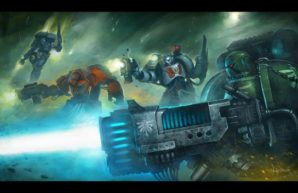 What makes you, you? How can you be anything other than yourself? Is the human brain nothing more than a complex physical organ, or does it contain something unquantifiable? Is there such a thing as a soul? These are the difficult questions The Swapper asks its players as they traverse the lonely halls of an abandoned space station in orbit around a barren, alien world. By the end, you might find yourself harboring an entirely new perspective on what it means to be alive.
What makes you, you? How can you be anything other than yourself? Is the human brain nothing more than a complex physical organ, or does it contain something unquantifiable? Is there such a thing as a soul? These are the difficult questions The Swapper asks its players as they traverse the lonely halls of an abandoned space station in orbit around a barren, alien world. By the end, you might find yourself harboring an entirely new perspective on what it means to be alive.
You play an unknown, faceless astronaut that is unceremoniously ejected from space station Theseus and sent to the planet below. There is no immediate goal or exposition, only exploration and survival. As you navigate the planetside mining facility and, eventually, find a way back to Theseus, The Swapper’s bizarre story begins to unfold. You are not alone.
The game’s lynchpin is a device called the swapper. It was retro-engineered from discoveries made by examining the mysterious sentient stones found on the alien planet. The swapper’s function is two-fold. It has the ability to create up to four clones of its user and swap consciousness between them, leaving the “empty” replicates to mirror the movements of the player. The swapper is the only tool you’ll have to surpass the many puzzles and obstacles of Theseus. You progress not by enhancing the power of this device, but by naturally learning the true extent of its capabilities. Every single puzzle you encounter is immediately solvable, provided you can wrap your brain around it.
While The Swapper’s story might throw you for a loop, thankfully the gameplay is straightforward enough. You’ll be doing plenty of traveling around Theseus, and chances are that there’s going to be an inconveniently placed security gate between you and your destination. These gates require a specific number of security orbs to be opened, and said orbs will always be found where devious puzzles lurk. So it’s up to the swapper, your wits, and you (and you, you, you, and you) to crack the station wide open to get at its delicious secrets.
The Swapper has great philosophical depth, but its puzzles are equally impressive. At their core, each puzzle revolves around the proper placement, and order of placement, of your clones to reach the coveted security orb. This, of course, becomes much more complicated when you throw consciousness swapping, pressure plates, gravity reversal, and fields that block cloning and/or swapping into the mix. There’s a good chance that you’ll need to sit and stare at more than a few puzzles before an epiphany strikes you.
Now all of this is good fun, but there’s an unnerving side effect to this manner of puzzle solving. It’s inevitable that dozens, maybe even hundreds, of your clones will meet gruesome fates during your stay on Theseus. When you send another you careening off a ledge to their death, there’s some guilt there. What if you had been inhabiting that particular clone previously? Did you just die, or is that someone else now? Are any of these clones you anymore? Even if you had changed at some base level, you’d never be able to recall what you were from what you are now. Is this still considered life?
This constant, internal debate is only heightened by the painstakingly crafted setting. The entirety of The Swapper’s visual style is made from claymation. Not a colorful and cartoony sort, but bleak and oddly realistic. It adds a surreal quality that meshes well with the overall tone of the game and the questions it asks. The sound direction is wonderfully minimalistic, placing an emphasis on silence to increase the feeling of isolation. Small, distant noises echo through corridors, and a handful of haunting melodies ooze melancholy.
The Swapper is an excellent game for anyone who enjoys puzzles, philosophy, or just fantastic atmosphere. It’s genuinely fun to play, and there’s no higher praise for a game than that. The only real downside is that there’s not more of it. Clocking in at around three hours, it won’t occupy you for much longer than an afternoon. However, the secret log terminals and second ending make a good case for a replay or two.




